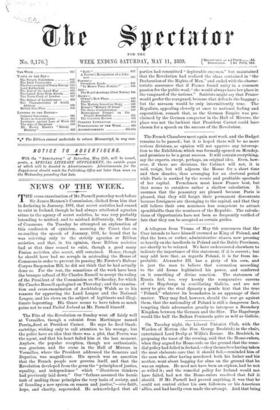The Fete of the Revolution on Sunday went off fairly
well at Versailles, though a colonist from Martinique named Perrin,fired at President Carnot. He says he fired blank- cartridge, wishing only to call attention to his wrongs ; but the police have an idea that there was a plot, that Perrin was the agent, and that his heart failed him at the last moment. Anyhow, the popular reception, though not enthusiastic, was gracious, and the scene in the Hall of Mirrors in Versailles, where the President addressed the Senators and Deputies, was magnificent. His speech was an assertion that the French people now governs itself, and that the Revolution developed from the germ the "principles of justice, equality, and independence" which "illustrious thinkers had previously laid down." Our "fathers assumed the heroic task of making those principles the very basis of society, and of founding a new system on reason and justice,"—vice faith, hope, and charity, superseded. He acknowledged that all parties had committed "deplorable excesses," but maintained that the Revolution had realised the ideas contained in "the Declaration of the Rights of Man," and ended with the charac- teristic assurance that if France found unity in a common passion for the public weal," she would always have her place in the vanguard of the nations." Satirists might say that France would prefer the rearguard, because that defends the baggage ; but the sarcasm would be only intermittently true. The Royalists, appealing cleverly at once to national feeling and superstition, remark that, as the German Empire was pro- claimed by the German conqueror in the Hall of Mirrors, the place was not the luckiest that President Carnot could have chosen for a speech on the success of the Revolution.






































